Milwaukee leaders discuss criminal justice reform, tackling violent crime
By: Steve Schuster, [email protected]//June 14, 2023//
Milwaukee leaders discuss criminal justice reform, tackling violent crime
By: Steve Schuster, [email protected]//June 14, 2023//
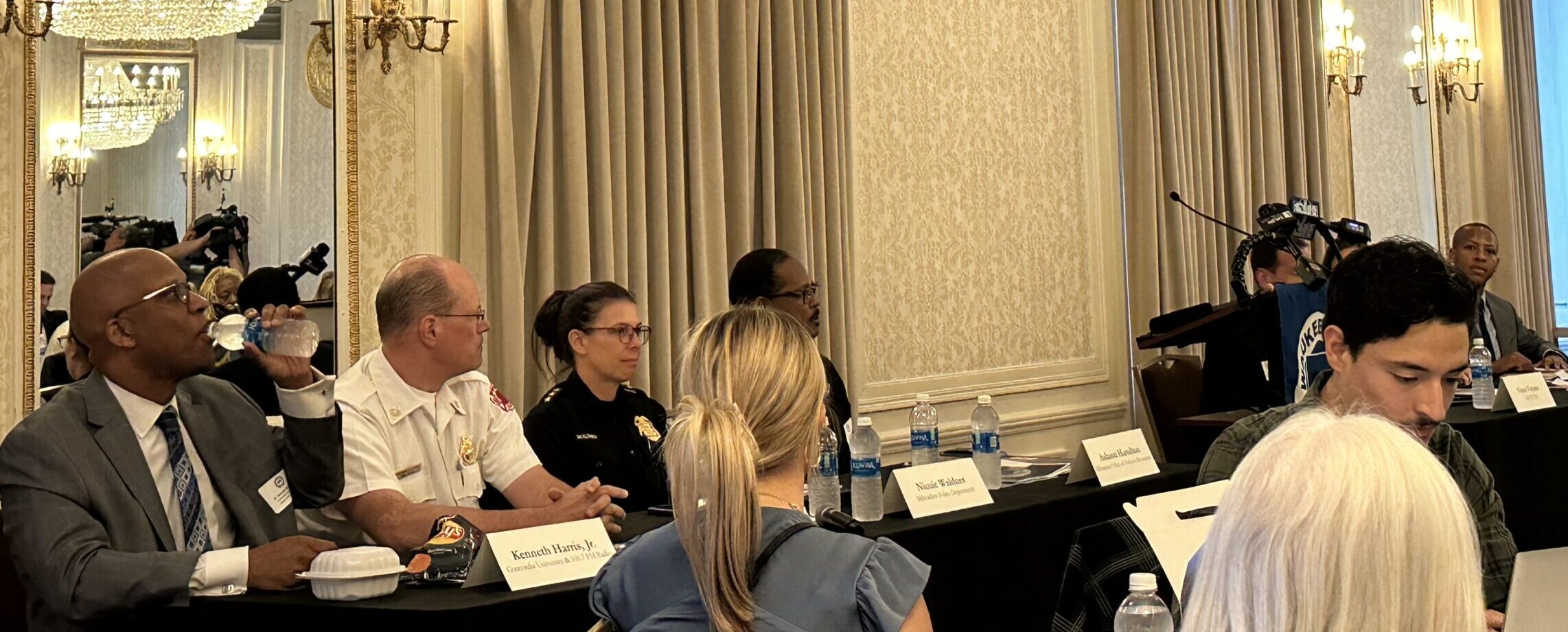
By Steve Schuster
A panel discussion by community leaders Tuesday in Milwaukee slated to address violent crime evolved into a much broader discussion on criminal justice reform in Wisconsin’s largest city.
The conversation began with community leaders describing how police, firefighters, and Emergency Medical Technicians (EMTs) are on the front lines everyday saving lives and seeing the worst in humanity – from those who have been thrown from vehicles to others who have been stabbed or shot.
“The actual thing that hits in the core of the brain and in the heart of the firefighters and paramedics dealing with these things is the mother and the father standing there reeling from the core of their being in anguish and pain. You’re doing everything you can (to save them) and you’re not winning some of them,” said Aaron Lipski Milwaukee Fire Department Chief.
“That’s your work environment, over and over and over again. I’m not 100% certain of what people’s perceptions are of what firefighters and EMTs are capable of absorbing, but it isn’t this, not at this pace,” Lipski added, noting, “this is not a television show … (We’re not at) the movies. These are things that are happening with a hair trigger.”
Nicole Waldner Assistant Chief, Milwaukee Police Department pointed out that “we’re only in June,” noting that historically crime will spike as the weather gets warmer during the Summer months.
Waldner said MPD is planning to address the Summer spike in crime though a number of strategic initiatives, including better information from the community.
“If you know something tell us,” she said.
“We are urging parents to be responsible for their kids. It’s not a free for all just because there is no school,” Waldner added, noting that parents need to know where their children are, be responsible for a curfew, and be more careful how guns are stored.
“If you’re under 17, you should stay home. Parents are going to get citations too,” Waldner said.
“The amount of guns on the street is shameful,” she added, urging gun safety.
Vince Vitrano said some Milwaukee police officers have told him they “police less aggressively” following the George Floyd protests, as the officers did not feel supported by the community, city hall, leadership, or the Fire and Police Commission.
Vitrano then asked the Assistant MPD Chief if she witnessed this too.
Assistant Police Chief Waldner said she has “heard that a lot as well.”
Waldner said officers often go from call to call seeing mostly sadness and violence.
“No one calls us to tell us about their good day, right? They are calling because everything sucks,” Waldner said.

In the context of George Floyd, Waldner said initially people dismissed it as a local problem for Minnesota, but that couldn’t be further from reality.
“A lot of the sentiment back then was, but it didn’t happen here. We aren’t Minneapolis,” Waldner said noting that the perception has drastically shifted.
“Anything that happens nationally to blue affects blue. Their (police) bad actions have an effect on our communities,” Waldner added.
Waldner said that there are some cops who shouldn’t be cops.
“Some of those officers, I have to wonder, do I really want them on the job?,” Assistant MPD Chief Waldner added.
“That’s the truth. Not everyone should be an officer. If you shouldn’t, then you should go, because if this is not where you want to police in Milwaukee where there is diversity, and social differences, and all of these wonderful things … if you can’t see that then peace out, you gotta go,” Waldner said.
In response, Ashanti Hamilton the Director of the Milwaukee Office of Violence Prevention said, ” I want everybody in the room to just realize what’s happening. The Assistant (Police) Chief just stood before the press and said hold us accountable and if you don’t understand how to police in this community and police with constitutionality, dignity and respect, then you don’t need to be in this police department.”
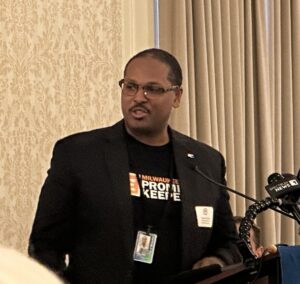
Hamilton said the communities impacted by violence don’t want a “hands off approach” to policing.
“They want more presence from police, but in a more dignified and respectful way,” Hamilton added.
Kenneth Harris, Jr. who now works as an Associate Professor of Justice & Public Policy at Concordia University has retired from his position as a Lieutenant with the Milwaukee Police Department.
After nearly three decades of law enforcement service, he joked, “What the city gifted me upon retirement was a pension and post-traumatic stress disorder,” noting that as he carried out his sworn duties, risk was a constant companion and he often faced death and tragedy as first responders in Milwaukee face on a daily basis.
Harris noted many of the issues police face on their daily jobs are issues that should have really been addressed by family – not at taxpayers expense.
“We have been spending an inordinate amount of time blaming the police and making the police do things that they literally cannot do. They go to the homicide after the fact, not before, but yet you expect them to clean up everything and they can’t. Why? Because the people won’t act right, and we won’t hold them accountable,” Harris said.
“We keep hearing over the decades that we want the police to work with the community, but I’ve not heard one person here say we want the community to work with the police,” he said.
“The police have to constantly change and move and grow and do all of these things while the public gets to act a fool, gets to shoot and kill each other. Can we protest against the kid, the one-year-old that died, instead protesting against the police? Nope, we don’t do that. We’ll just report about it and we’ll talk about it and we’ll run the story over and over and over,” Harris added.
“Why aren’t we protesting about the deaths in our community? … Police don’t control homicides, they investigate them. It’s reactionary, but there are some precursors you pretend you don’t see. Poverty, social issues, education, but you don’t want to fix those. You’d prefer to blame the police,” Harris said that the community wants strategy, but no one wants to talk logistics.
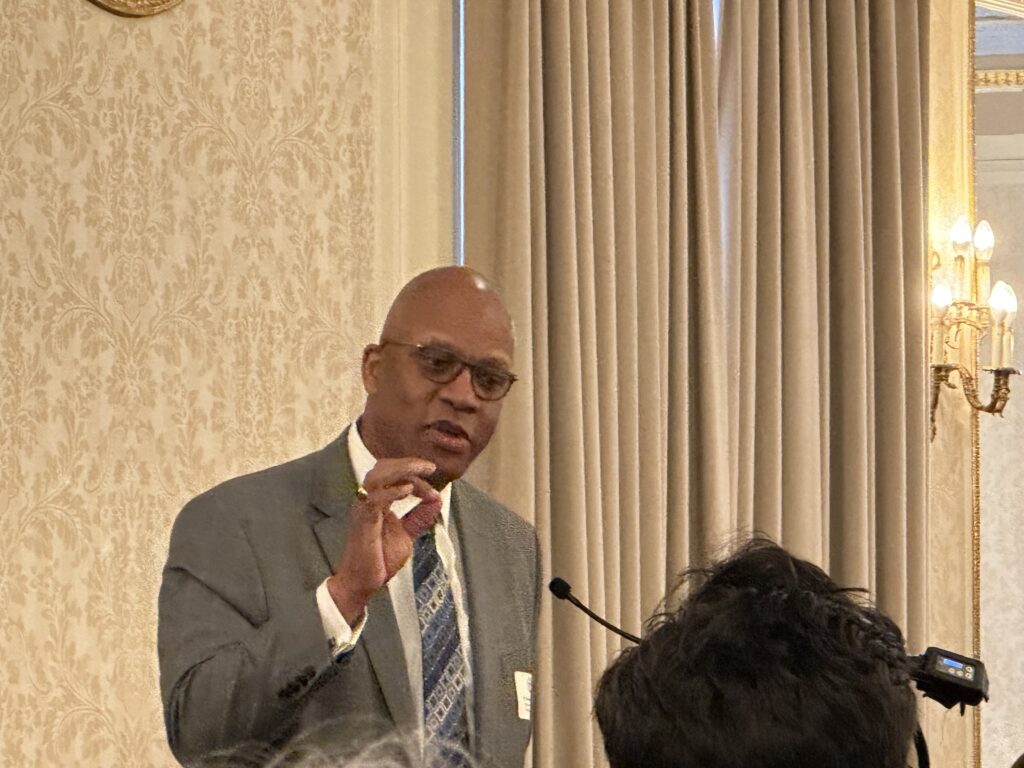
As previously reported by the Wisconsin Law Journal, Milwaukee Mayor Johnson said there is a direct link between poverty, crime, and climate change.
“There is a nexus between them all,” Johnson said in an interview with the Wisconsin Law Journal in Chicago last week.
“Poverty leads to violence and violence is crime. Where climate change comes into that nexus is the fact that in Milwaukee years ago, we had the highest quality of life for African Americans in the United States. That’s because folks had access to good paying family supporting careers in heavy manufacturing. Those jobs dried up and went to right-to-work states in the South, and they went overseas for cheap labor leaving those same neighborhoods — neighborhoods that I grew up in … quite frankly, sort of in the lurch, holding the bag where the people who lived there didn’t have access to those family and support opportunities,” Johnson previously said.
On Tuesday in Milwaukee, Waldner then pointed out how the COVID pandemic has made public safety even more challenging with backlogs in the courts and staff shortages.
“I think in 2020 what happened, the floor fell out. Everyone stopped. We (police) didn’t stop, but everybody else stopped, right? Courts barely functioned and now we have this tremendous backlog, which we are still not caught up,” Waldner said, noting that police are overburdened by calls for service and the courts lost so many court reporters.
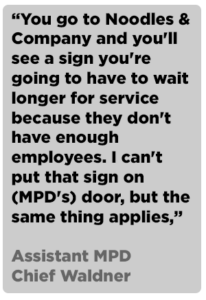
“You go to Noodles & Company and you’ll see a sign you’re going to have to wait longer for service because they don’t have enough employees. I can’t put that sign on (MPD’s) door, but the same thing applies,” Waldner said.
Waldner noted whether in the juvenile justice system at Lincoln Hills or adults, the definition of insanity is doing the same thing over and over again trying to obtain a different result, but still getting the same result as police do on a daily basis.
However, to compound matters, crimes have changed and gotten worse, Waldner said, noting that “We are not dealing with the juveniles of the 1970s.”
The solution? Counseling, trade school, and other education opportunities, she said.
“I have the authority to arrest and take away freedom and that’s where it stops,” Waldner said.
Community leaders also pointed out opportunities for improvement with local media coverage, including not over sensationalizing stories for the purpose of more viewers or readers, not taking things out of context, and minimizing harm when it comes to unjustly damaging reputation of the city of Milwaukee.
For examples, officials pointed out how a when a Germantown man was killed in Milwaukee, the way the media coverage presented the news it just fed the false stigma and false stereotypes of how Milwaukee is dangerous for suburban or rural visitors.
“When I see things in the news ‘Germantown man killed on 95th and Silver Spring’ I was like what that does to everybody outside of Milwaukee. Oh my God, Germantown people don’t come to Milwaukee, it’s dangerous. Why was a Germantown man on 95th and Silver Spring?,” Waldner said.
“It says to the people who don’t live in our city, and don’t know our city, that it’s dangerous. It’s not dangerous, if you don’t go to 95th and Silver Spring looking for something you shouldn’t have,” she said.
“There is so much going on here and people only get their information from the news. It makes us look a lot worse than we really are,” Waldner added.
In response, Vitrano later described incidents including car jackings in the 3rd Ward and shootings after a Bucks game.
Waldner replied, “Keep it in perspective …”
“There are still educated people that live in this city that love this city that don’t commit crimes,” Waldner said.
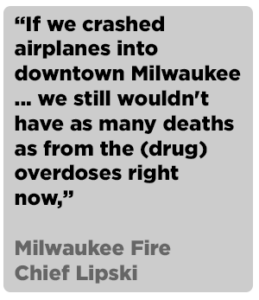
Officials said since COVID, first responders are dealing with not only violent crime and drug overdoses, but also now reckless driving.
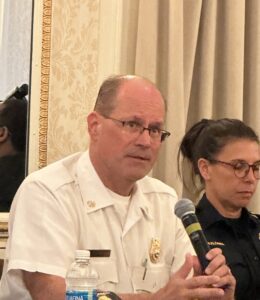
“If we crashed airplanes into downtown Milwaukee … we still wouldn’t have as many deaths as from the (drug) overdoses right now,” said Lipski.
Lipski said the drug problem is more widespread than Hollywood portrays on television.
“It’s your family members. It’s your co-workers. It’s your doctors. It’s your grocer. It’s the guy who came to fix your roof. It is everywhere, and it’s not at its foundation a crime. It is a mental health crisis, but for years we have been criminalizing it,” he added.
Harris disagreed and said, “If they commit a crime, they need to be held accountable for it.”
Harris said a double standard exists in our criminal justice system, noting that when illegal drug use has been an issue with persons of color there are criminal penalties, but when Caucasians get caught with illegal drugs, “it’s a mental health issue.”
“We have to stop pretending that when the shade changes … now it becomes a mental health issue,” Harris said.
Legal News
- Wisconsin attorney loses law license, ordered to pay $16K fine
- Former Wisconsin police officer charged with 5 bestiality felony counts
- Judge reject’s Trump’s bid for a new trial in $83.3 million E. Jean Carroll defamation case
- Dozens of deaths reveal risks of injecting sedatives into people restrained by police
- The Latest: Supreme Court arguments conclude in Trump immunity case
- Net neutrality restored as FCC votes to regulate internet providers
- Wisconsin Attorney General asks Congress to expand reproductive health services
- Attorney General Kaul releases update at three-year anniversary of clergy and faith leader abuse initiative
- State Bar leaders remain deeply divided over special purpose trust
- Former Wisconsin college chancellor fired over porn career is fighting to keep his faculty post
- Pecker says he pledged to be Trump campaign’s ‘eyes and ears’ during 2016 race
- A conservative quest to limit diversity programs gains momentum in states
WLJ People
- Power 30 Personal Injury Attorneys – Russell Nicolet
- Power 30 Personal Injury Attorneys – Benjamin Nicolet
- Power 30 Personal Injury Attorneys – Dustin T. Woehl
- Power 30 Personal Injury Attorneys – Katherine Metzger
- Power 30 Personal Injury Attorneys – Joseph Ryan
- Power 30 Personal Injury Attorneys – James M. Ryan
- Power 30 Personal Injury Attorneys – Dana Wachs
- Power 30 Personal Injury Attorneys – Mark L. Thomsen
- Power 30 Personal Injury Attorneys – Matthew Lein
- Power 30 Personal Injury Attorneys – Jeffrey A. Pitman
- Power 30 Personal Injury Attorneys – William Pemberton
- Power 30 Personal Injury Attorneys – Howard S. Sicula











